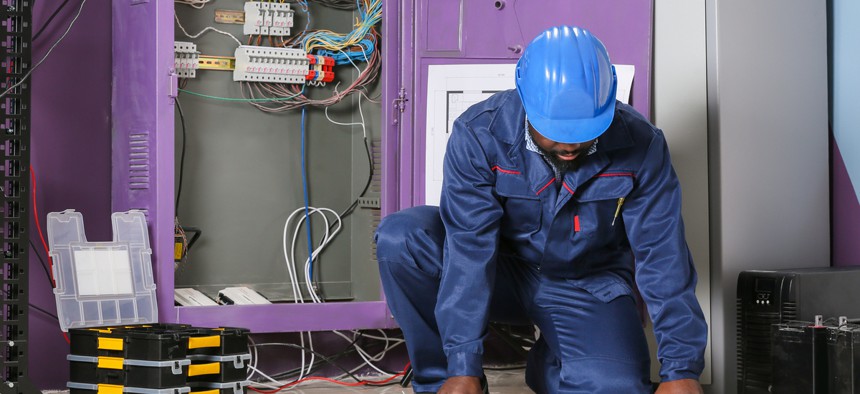Small Business Owners with Criminal Records Sue Over Pandemic Aid Restrictions

Some small business owners with criminal records are barred from receiving pandemic aid. Shutterstock

Connecting state and local government leaders
Many small business owners with criminal records were shut out of the Paycheck Protection Program, which was designed to keep employees on payrolls during coronavirus lockdowns.
Sekwan Merritt is one of many small business owners who has been hit hard by the recent economic downturn. He had hoped that his Baltimore-based electrical services company, Lightning Electric, could get a loan through the Paycheck Protection Program, a federal initiative designed to help small businesses maintain payrolls during coronavirus lockdowns.
But when Merritt went to apply for the PPP, which was created under coronavirus relief legislation enacted in late March, he learned that because he is on parole for a 2012 non-violent drug conviction, he could not receive the loan he needed to keep his business afloat. He has already had to lay off one of his employees, and has borrowed more than $30,000 from family.
“It’s really tough right now,” he said. “Payroll is coming around again. A loan from the [Small Business Administration] would have been really good for me … Sometimes I don’t know how I'll make it.”
Now, Merritt is one of several small business owners with criminal convictions suing the SBA over restrictions in the PPP that bar certain people with criminal records from gaining access to pandemic aid.
The lawsuit, filed jointly by the Public Interest Law Center, ACLU, and Washington Lawyers’ Committee for Civil Rights and Urban Affairs, argues that the criminal record exclusions have exacerbated the pandemic’s disproportionate impacts on communities of color.
Though it isn’t known how many small businesses are owned by people with criminal records, there are between 70 and 100 million Americans who have some sort of criminal record—and that group is disproportionately full of people of color, particularly Black men. Estimates produced for the lawsuit by Christopher Wildeman, a professor at Cornell University, suggest that 2% of white business owners, 15% of Black business owners, and 10% of Latino business owners have been incarcerated at some point.
Additionally, the lawsuit claims that the SBA acted unlawfully by implementing an “arbitrary and capricious” rule restricting those with criminal records when such a stipulation was not spelled out by Congress. In implementing new restrictions for the PPP loans, the lawsuit claims that the SBA took “Congress’s straightforward mandate to administer the PPP to sustain small businesses—and the workers they employ—and added unnecessary, confusing, inconsistent, unexplained, and shifting exclusions of small-business owners who have had contact with the criminal-legal system.”
The SBA declined a request for comment, saying they do not discuss pending litigation—but the SBA has said that they imported requirements for the PPP from a different loan program that excludes small business owners who are on probation, parole, or currently facing charges. Additional restrictions—such as a categorical ban on anyone convicted of a felony in the past year—seem to be new, however.
Claudia De Palma, a staff attorney for the Public Interest Law Center, said that the restrictions on business owners with criminal records goes against the very purpose of the CARES Act to “[keep] American workers paid and employed.”
“These loans are supposed to keep people afloat,” she said. “It's contrary to that purpose to start excluding categories of operating businesses that are paying people and putting money in the economy. It isn’t rational.”
The lawsuit also takes aim at the SBA’s communication around the rules regarding criminal records, which have changed multiple times. Originally, the SBA banned business owners with current charges or those with felony convictions in the past seven years. A few days later, the PPP application asked for a more comprehensive criminal history, including any time spent on probation prior to a felony verdict, even if the individual eventually wasn’t convicted. The rules have since changed several more times, and now restrict anyone with a felony conviction in the past year, anyone with a conviction for a financial crime in the past five years, people on parole and probation (including those on probation pre-judgment), and those with pending charges.
De Palma said that many of those changes were made without notice or explanation, meaning some small business owners were left questioning their eligibility throughout the application process, and others gave up entirely. “Those changes were hard even for a team of lawyers to sort through, let alone business owners,” she said.
The lawsuit asks for a three-week extension to the PPP application deadline, from June 30 to July 21. According to the latest reported numbers, the program still has roughly $120 billion to distribute to small businesses.
Merritt would like to receive some of that money—not just for his business and employees, but so that he can be a role model for his community. He founded his business shortly after he returned home from prison in 2017, and has since made it a point to hire other formerly incarcerated people so that they have a chance to rebuild their lives. “I think, as a society, we should promote these positive examples of change,” he said. “If you're restricting me from being an entrepreneur, what examples do people have to look at for change? Even beyond the PPP … we as a society need to have a vested interest in people’s rehabilitation. It's in the best interest of everyone.”
Emma Coleman is the assistant editor for Route Fifty.






